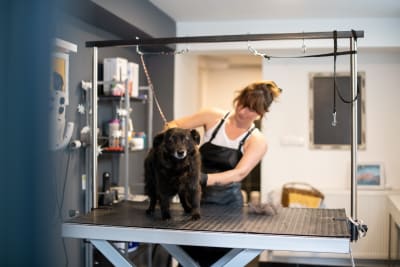Veterinary technicians in Vermont thrive because they can take on clinical and administrative duties in veterinary establishments. This significantly alleviates pressure on veterinarians and facilitates the smooth running of any vet clinic or hospital.
The state’s major requirements for aspiring veterinary technicians can be quite tricky. We have broken down the process into easily digestible elements below to remove some of the challenges.
The first section provides a step-by-step overview of the basic requirements before moving on to certification and licensing possibilities. Furthermore, we list a few accredited programs for candidates in Vermont to consider and analyze the salary prospects for the profession.
How to Become a Veterinary Technician in Vermont
Below is a step-by-step overview of the key requirements needed to become a vet tech in Vermont.
Educational Options
Candidates looking to become vet techs in the state must pass through a training program. They are expected to receive training from a program accredited by the AVMA-CVTEA.
The section below provides a list of prominent accredited training options. Applicants may also opt for hybrid programs that allow them to learn fundamental topics through online materials before completing their education through a real-world externship.
During their training program, candidates must learn toxicology, pharmacology, office procedures, animal care and restraint, and animal diseases.
They also typically graduate with an associate degree after 24 months of study.
Passing the VTNE
Vermont residents are expected to pass the Veterinary Technician National Examination before becoming legal professionals in the state. The state also offers voluntary certification; candidates must pass the VTNE to qualify.
Employment & Career Launch
Veterinary technicians in Vermont can begin their careers working in many clinics and hospitals in the state. They may also be able to take on specialty roles, such as surgery technicians instead of general technicians.
Explore other careers with similar paths:
Top Veterinary Technician Schools in Vermont
The list below contains the top accredited veterinary technician programs for candidates in Vermont to consider.
Vermont State University
Randolph, VT Campus Only
Vermont State University — through its School of Agriculture, Plant and Animal Sciences — has a veterinary technology program certified by the CVTEA. Certified veterinary technicians oversee the program, which includes topics in reproduction and genetics, office procedures, laboratory procedures, pharmacology, and animal nutrition.
Tuition
$608 - $1,083 per ProgramContact
(802) 728-1446
Jack.Lareau@VermontState.edu
Penn Foster College
Online, VT Online Only
Candidates in Vermont looking for an online program with necessary accreditation may consider the one available at Penn Foster College. The program is notable for its comprehensiveness and pathway to acquire a Bachelor of Science degree.
Tuition
$1,599 - $1,999 per SemesterContact
(570) 961-4033
infoims@pennfoster.com
Colby Community College
Online, VT Campus + Online
At Colby Community College, candidates can acquire training through a program with a very high first-time pass rate in the VTNE.
Tuition
$145 - $230 per CreditContact
(785) 460-5462
vetnursing.assistant@colbycc.edu
Explore nearby states for education and training:
Licensure & Certification Requirements
The state of Vermont expects veterinary technicians to pass the Veterinary Technician National Examination. However, becoming a certified veterinary technician in the state continues beyond there.
Although it is not compulsory by law, the Vermont Veterinary Technician Association offers candidates the opportunity to become certified and enjoy several benefits associated with certification. These include professional opportunities, credibility, potentially higher salaries, and networking opportunities.
To become licensed, applicants must register with the Vermont Veterinary Technicians Association and pay a membership fee, which may vary from year to year.
Once certified, candidates are still expected to renew their status every two years by completing 18 continuing education credits within the validity period.
Continuing education opportunities are posted on the association’s website, and candidates may also go through online continuing education courses from VetMedTeam or VetBloom, among other options.
Salary & Career Outlook
The annual average salary of a veterinary technician in Vermont can be as low as $30,896 if they are among the bottom 10% or as high as $51,412 if they are among the highest-paid in this state. Most veterinary technicians will not fall into either of these categories but will most likely find themselves among the median earners, taking home an annual average salary of $39,855.
The factors that affect the annual average salary of a veterinary technician in the state include experience, location, and specific employers. In terms of location, South Burlington is the highest-paying city, with an annual average salary of $43,988.
Manchester Center and Williston are among the most notable locations, with annual average salaries of $42,490 and $41,672, respectively. The Bureau of Labor Statistics reports show that veterinary technology will continue to improve in the coming decades.
More positions will also arise for interested candidates as older technicians retire.





